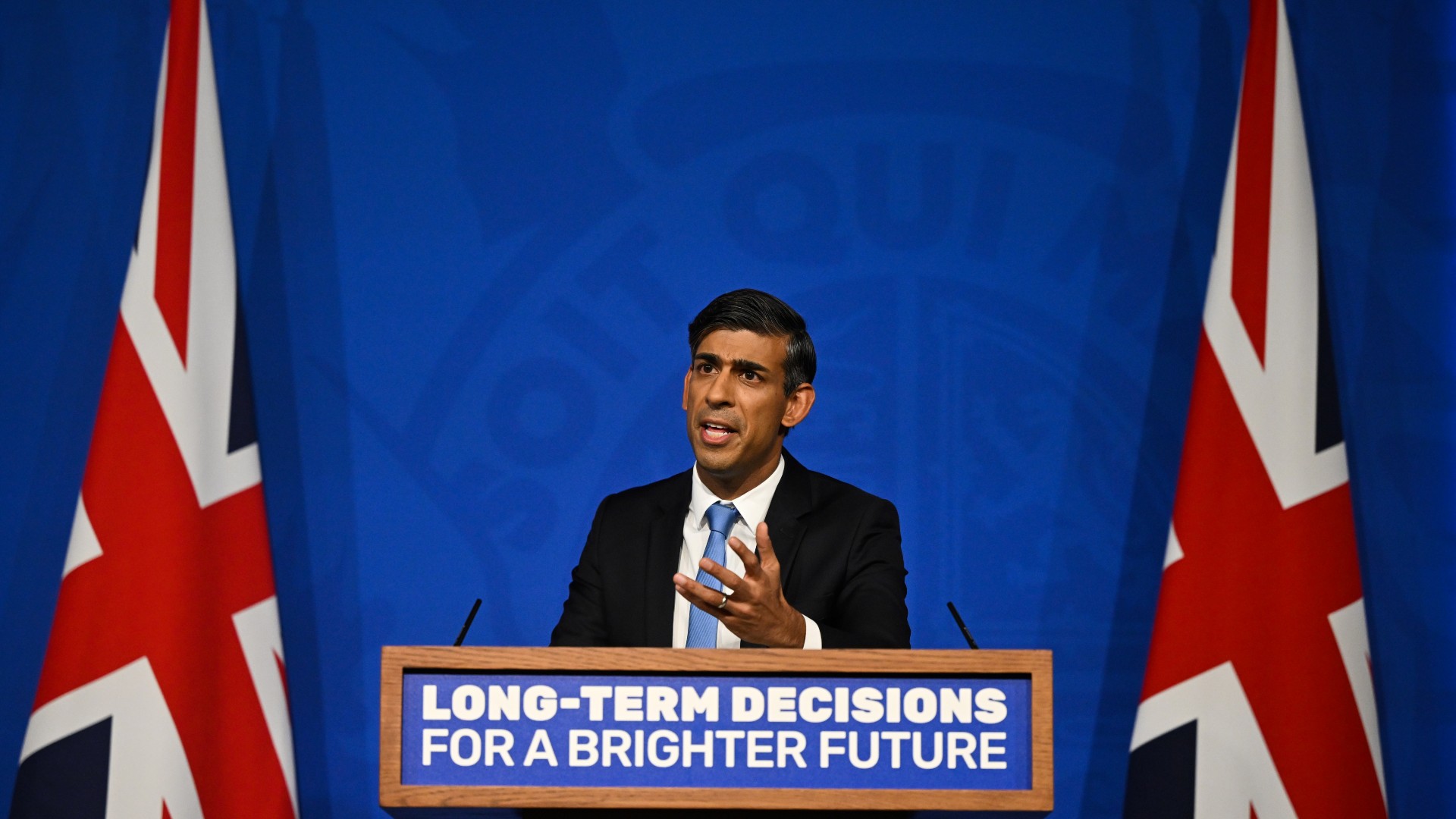Rishi Sunak's tree code: what is the PM's election strategy?
Conservative leader lining up major policy announcements in bid to rebrand as 'change' candidate

A free daily email with the biggest news stories of the day – and the best features from TheWeek.com
You are now subscribed
Your newsletter sign-up was successful
More than 17 years after then Tory leader David Cameron replaced the party's torch logo with an oak tree, Rishi Sunak appears to have taken the idea a step further.
The prime minister has a new list priorities for the "second phase" of his premiership, said The Times, and such was "the desire for secrecy" – "and no little paranoia" – surrounding the projects that Downing Street has used codenames based on trees. What "some are describing as Rishi 2.0" began last week with the reveal of "Project Cedar": the "significant watering down of green policies on the route to net zero".
With Labour consistently polling between 15 and 20 points ahead of the Conservatives, Sunak appears to have little to lose in trying to position himself as the candidate for "change" – "a word he used 27 times" during his net-zero speech last week, the paper added.
The Week
Escape your echo chamber. Get the facts behind the news, plus analysis from multiple perspectives.

Sign up for The Week's Free Newsletters
From our morning news briefing to a weekly Good News Newsletter, get the best of The Week delivered directly to your inbox.
From our morning news briefing to a weekly Good News Newsletter, get the best of The Week delivered directly to your inbox.
Yet he is already facing criticism over Cedar and another project that has yet to be formally unveiled. "Project Redwood" includes plans to scale back the HS2 rail project beyond Birmingham, according to The Independent. The paper said last week that the government was in "disarray" over the plan to pause or even axe the second phase of the line to Manchester, amid fears that the backlash from industry leaders "could cost them votes at the general election".
What did the papers say?
Sunak has spent much of his time in No. 10 trying to "restore stability after several years of chaos and acrimony among Conservative MPs", said PoliticsHome. But while he has been "largely successful in that endeavour", polls suggest he has yet to win back voters.
Now, "with time running out to turn it around", Sunak is "going on the offensive". The PM clearly hopes his "bold" new policy announcements will create clear dividing lines between the Tories and Labour in the eyes of the public, said the site, "even if he rubs some Conservative backbenchers up the wrong way".
Other major policy reveals on education (Project Elm) and health (Project Hawthorn) are expected in the coming months. Yet what will be proposed is "almost not the point", wrote The Sunday Times's chief political commentator Tim Shipman. The significance is rather "that this is a government determined to sell Sunak afresh".
A free daily email with the biggest news stories of the day – and the best features from TheWeek.com
This strategy carries "risks", warned The Guardian's Westminster correspondent Kiran Stacey. Sunak is viewed by most voters as a “pragmatic problem-solver", and after 13 years of Tory rule, positioning him as a radical change candidate at the next election "may prove difficult".
The policies that he is announcing may also fail to woo voters, with polling suggesting that a majority back net zero measures. Some Tories fear that "in the hunt for a last-ditch election winner", their leader will "end up making himself less popular among voters", Stacey continued.
Far from the "political equivalent" of Bazball – "the swashbuckling style of cricket which has transformed England's results over the past year" – Sunak's climate target delay announcement may have been "more like a Hail Mary pass in American football: a desperate final long throw attempted by a losing side".
What next?
Sunak is "at risk of seeing his reset derailed (geddit?) by the noise around HS2", said Politico's "London Playbook" newsletter.
The PM will be using his first speech as Tory leader at next week's party conference in Manchester to re-introduce himself to the British public. Announcing further cuts to the high-speed rail line to Manchester days before he heads to the city is "hardly ideal", but delaying the decision "guarantees the question mark over HS2 will hang over conference like a bad smell".
The conference slogan is "long-term decisions for a brighter future". But "long-term planning is a way of governing, not a way of campaigning", said The Sunday Times's Tim Shipman. "What the wave of announcements – in the conference speech, a King's Speech and an autumn statement, all before the end of November – will show is a more authentic Sunak."
Whether the public will like what they see is another matter.
Elliott Goat is a freelance writer at The Week Digital. A winner of The Independent's Wyn Harness Award, he has been a journalist for over a decade with a focus on human rights, disinformation and elections. He is co-founder and director of Brussels-based investigative NGO Unhack Democracy, which works to support electoral integrity across Europe. A Winston Churchill Memorial Trust Fellow focusing on unions and the Future of Work, Elliott is a founding member of the RSA's Good Work Guild and a contributor to the International State Crime Initiative, an interdisciplinary forum for research, reportage and training on state violence and corruption.
-
 The ‘ravenous’ demand for Cornish minerals
The ‘ravenous’ demand for Cornish mineralsUnder the Radar Growing need for critical minerals to power tech has intensified ‘appetite’ for lithium, which could be a ‘huge boon’ for local economy
-
 Why are election experts taking Trump’s midterm threats seriously?
Why are election experts taking Trump’s midterm threats seriously?IN THE SPOTLIGHT As the president muses about polling place deployments and a centralized electoral system aimed at one-party control, lawmakers are taking this administration at its word
-
 ‘Restaurateurs have become millionaires’
‘Restaurateurs have become millionaires’Instant Opinion Opinion, comment and editorials of the day
-
 How corrupt is the UK?
How corrupt is the UK?The Explainer Decline in standards ‘risks becoming a defining feature of our political culture’ as Britain falls to lowest ever score on global index
-
 How long can Keir Starmer last as Labour leader?
How long can Keir Starmer last as Labour leader?Today's Big Question Pathway to a coup ‘still unclear’ even as potential challengers begin manoeuvring into position
-
 The high street: Britain’s next political battleground?
The high street: Britain’s next political battleground?In the Spotlight Mass closure of shops and influx of organised crime are fuelling voter anger, and offer an opening for Reform UK
-
 The MAGA civil war takes center stage at the Turning Point USA conference
The MAGA civil war takes center stage at the Turning Point USA conferenceIN THE SPOTLIGHT ‘Americafest 2025’ was a who’s who of right-wing heavyweights eager to settle scores and lay claim to the future of MAGA
-
 Is a Reform-Tory pact becoming more likely?
Is a Reform-Tory pact becoming more likely?Today’s Big Question Nigel Farage’s party is ahead in the polls but still falls well short of a Commons majority, while Conservatives are still losing MPs to Reform
-
 What does the fall in net migration mean for the UK?
What does the fall in net migration mean for the UK?Today’s Big Question With Labour and the Tories trying to ‘claim credit’ for lower figures, the ‘underlying picture is far less clear-cut’
-
 Five takeaways from Plaid Cymru’s historic Caerphilly by-election win
Five takeaways from Plaid Cymru’s historic Caerphilly by-election winThe Explainer The ‘big beasts’ were ‘humbled’ but there was disappointment for second-placed Reform too
-
 The new age of book banning
The new age of book banningThe Explainer How America’s culture wars collided with parents and legislators who want to keep their kids away from ‘dangerous’ ideas